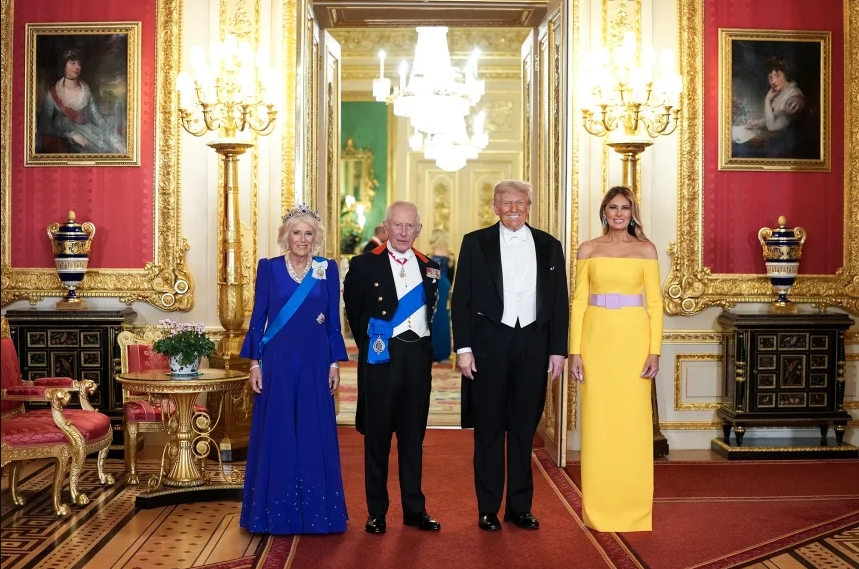Carolyn Baugh’s affinity for Egyptian culture is evident in all aspects of her life, especially her office. Colorful tapestries, framed family photos and Arabic posters adorn the walls.
Baugh, an assistant professor in Gannon University’s history department, does not fit the usual description of an Egyptian, however. A petite, soft-spoken woman with dark blond hair and blue eyes, she is of German descent. Her love affair with Egypt grew throughout her life, and it continues today.
Baugh was born July 13, 1972, in Evansville, Ind. – “practically Kentucky,” as she called it. She grew up with two brothers, who were eight and 10 years older.
“I had a happy, peaceful childhood, filled with music and nice people,” she said.
Her father made a career in the foreign service prior to having a family. He’d been stationed in Ghana, Africa, and Bogota, Colombia, among other places. Baugh said her parents’ love of travel inspired her own.
Baugh attended Duke University, spending nearly two years studying abroad at the American University in Cairo (AUC). There she joined the rowing team.
Rowing is a sport in which athletes race against each other in boats, which are propelled by oar blades pushing through water. In the United States, high school and college rowing is often referred to as “crew.”
Baugh became interested in the sport after her brother rowed while studying abroad in Scotland.
What happened next was the stuff Nicholas Sparks novels are made of. She met Tarek Albasti, the man who would become her husband, when AUC’s women’s team shared a boathouse with the Egyptian national team.
Baugh said he was flirtatious, greeting her every morning.
“In Arabic, there’s a way of making ‘good morning’ sort of go on for a long time,” she said. “In addition to saying, literally, ‘morning of goodness,’ you can say ‘morning of light,’ ‘morning of jasmine,’ ‘morning of cream,’ ‘morning of butter,’ and on and on.”
Albasti drew out his good mornings longer and longer. He said he was quite surprised when one day she replied in Arabic.
“I was shocked because I didn’t know she understood Arabic,” he said, “and it was like a big bucket of cold ice water fell on me.”
Albasti said other men on his team were vying for her affection and that he sought chances to get to know her. One day,
Baugh fell from her boat and into the water. He offered his shirt to her, and they quickly began dating.
He said he proposed to her after four months, and she bluntly told him he was “crazy.”
“I told her I never felt like this before,” Albasti said. “I couldn’t imagine myself with anyone else and I wasn’t playing around.”
More than a year after his proposal, she proposed to him, around the time she prepared to return to Duke. The two married in Egypt and made plans to move to the U.S. together.
Baugh’s rowing experience was not only unique because it brought her to her husband, but also because it challenged her physically.
According to USRowing, a nonprofit membership organization recognized by the United States Olympic Committee as the national governing body for the sport of rowing in the U.S., the sport is extremely hard on a person’s body.
“Physiologically,” the USRowing website states, “rowers are superb examples of physical conditioning. Cross-country skiers and long- distance speed skaters are comparable in terms of the physical demands the sport places on the athletes.”
“When my boyfriend, future husband, would introduce me to his friends, they wouldn’t believe that I was a female who rowed,” Baugh said. “I would have to show them my calluses. It really rips the skin right off your hands.”
Besides calluses, she gained upper body strength during her time out on the Nile River.
“I was muscly,” she said with a laugh. “Still am. I can crush my 70-pound bag in my basement.”
She said that she hasn’t done any rowing recently, though she’d love to.
“The thing about rowing in Cairo was that it was so quiet and peaceful on the river,” she said.
She said it gives a person a very calming feeling for a city so large.
“It’s always full of crowds and traffic and people, but you’d get out on the river and it’s very, very still. It’s a completely different perspective. It’s beautiful.”
Baugh said she simply does not have the time necessary to get back in rowing shape. In college, she had to wake at 5 a.m. for practice.
“Morning training takes a good two hours,” she said. “Now I have about 25 minutes.”
Baugh returned to Duke in 1994. Her then-boyfriend went with her. She joked that she nearly killed her mother-in-law by “abducting” her son to a new country.
Her own family was alarmed when they found out that she was in a relationship with an Egyptian, she said.
“They had a lot of preconceived notions,” she said, twisting the wedding band on her finger. “Many people do. Luckily they got to know my husband and see his kindness, his family loyalty and what a hard worker he is. They came around quickly.”
The couple has been married for 20 years. Baugh said video calling applications such as Skype have made it easy to keep in touch with her in-laws.
Baugh graduated summa cum laude from Duke in 1995. She earned an A.B. degree in Arabic and Arab literature. She went on to earn a master’s degree in Arabic and Islamic studies at the University of Pennsylvania in 2008.
She said she truly appreciated living in Philadelphia, a diverse and exciting city.
“It’s a little trafficky for my small-town-girl taste,” Baugh said. “It’s kind of hard logistically when you have kids to get around and get to all their functions. So I’m very happy to living in the country out in Fairview now.”
She said that Fairview is very similar to her hometown – same population size, same level of safety and kind neighbors.
“Where I live is quite out in the country,” she said. “It’s lovely and still and quiet. You can see the stars, which you couldn’t always in Philly.”
In July, her family moved to Fairview so that Baugh could accept her teaching position at Gannon. She said she’s torn between city living and country living. Luckily her husband still travels to Philadelphia for work, so she’s able to visit often. Together Baugh and her husband own a Mediterranean restaurant called Aya’s Cafe, where her husband is still involved in the day-to-day operations. He spends weekdays in Philly and returns to Erie on weekends.
Aya’s Cafe, which they have owned for 10 years, is named for their 14-year-old daughter. The two also have a 7-year-old daughter, Layla. Both girls’ names are Arabic, Aya meaning “miracle” and Layla meaning “night.”
Baugh said she encourages them to connect to their roots through Arabic language practice.
In fact, the girls traveled to Egypt with their father while Baugh was finishing her Ph.D. at Penn.
She said she worried how her daughters would adjust moving from one side of the state to the other. However, they’ve done well, picking up a number of school activities. They also landed ensemble roles in the Erie Playhouse Youtheatre’s production of “Aladdin Jr.,” which just ended its run.
Although her responsibilities as a mother take precedence, Baugh said she tries to carve out time to play piano. She said she inherited her musical aptitude from her grandmother, a trained classical pianist.
Baugh said she was lucky to grow up in a college town similar to Erie, where there were plenty of free concerts.
“I love Romantic music,” she said. “It’s very, very passionate. I like losing myself in it.”
She said she doesn’t get to play as much these days as she’d like to.
“By the time you get done with scales,” Baugh said, “somebody’s yelling at me needing something.”
She said she devotes most of her free time to writing.
Baugh has published two books. Her first novel, “The View from Garden City,” is based on her years in Egypt, telling the story of a young American student living in Cairo. Her second book, written under a pseudonym, will hit shelves this summer. This one centers on an Egyptian-American FBI agent.
She said she chose to use a pseudonym to separate her creative work from her academic work at Gannon. In both fields, she received praise.
Jeff Bloodworth, Ph.D., program director and associate professor in Gannon’s history department, met Baugh when she interviewed on campus for her current position.
“Dr. Baugh is an extraordinary teacher, scholar and colleague,” he said. “I don’t use those superlatives lightly.”
Bloodworth said her ability to engage students and passion for teaching are valuable assets to the university.
Moqbel Saggar, who took Baugh’s History through Arabic Literature class, said he agreed that Baugh is an excellent professor.
“She is so serious about her job,” Saggar said. “If you’re in one of her classes, you have to give as much as she gives.”
Saggar, a sophomore risk management and insurance major, said that Baugh knows almost everything about Arabic history and culture.
“She’s the Wikipedia of Arabic history,” he said.
This semester Baugh teaches History of Modern Egypt, a brand new course at Gannon.
“I’m really excited about that course,” Baugh said. “I have some really fun material that we can cover, including a great autobiography by Leila Ahmed.”
Ahmed, an Egyptian-American writer on Islam and Islamic feminism, is a women’s studies professor at Harvard University’s Divinity School. She was awarded the 2013 University of Louisville Grawemeyer Award in Religion for her analysis of the veiling of Muslim women in the United States.
“We’ll explore music and culture, including film,” Baugh said. “There’s some really fabulous historical films and films that illustrate the relationships between Muslims and Christians in Egypt.”
Baugh said the class will focus on Umm Kulthum, an internationally famous Egyptian singer, songwriter and actress.
Though she died in 1975, Kulthum is still widely regarded as the greatest female Arabic singer in history.
“In every taxi and every restaurant, you can hear her music playing,” Baugh said.
She said students can expect to gain an intense understanding of the country and its people.
“I think it’s a really good time to teach this class because I want to start with the 1952 revolution and end with the 2011 and 2013 revolutions,” Baugh said. “We’ll see what comparisons we can draw.”
Still, she said, she encourages students to learn outside the classroom, particularly through traveling to Arab nations.
“It’s such a life-changing experience to go to the developing world and really spend some serious time and really try to learn the language,” Baugh said.
“I hope to lead some Gannon trips there, and help students see the Cairo I know and love – people who love to laugh and whose hospitality and kindness are unmatched.”
APRIL SHERNISKY
[email protected]







